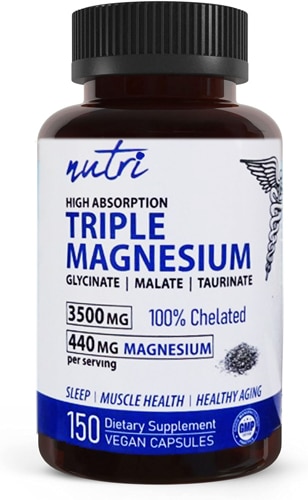[vc_row][vc_column][vc_column_text]A
poor night's sleep doesn't just leave you groggy, but also might lead to impaired brain health, according to a new study.
Researchers found that
those who experience "poor quality sleep" had brain scans that revealed nearly three years of additional brain aging beyond what is found in those who sleep more soundly.

Poor sleep was defined as both having trouble falling asleep and staying asleep. The accelerated aging process associated with impaired sleep can start as early as middle age.
The National Institute on Aging funded the study, and the results were published in Neurology, the medical journal of the American Academy of Neurology.
What the study found about sleep and brain health
As part of the research, participants filled out questionnaires -- both at the beginning of the study and five years later -- that gave researchers a sense of how frequently the survey respondents experienced:
- Short sleep duration
- Bad sleep quality
- Difficulty falling asleep
- Difficulty staying asleep
- Early morning awakening
- Daytime sleepiness
Based on their questionnaire answers, the study participants were divided into three groups:
- The "low" group included the 70% of respondents who had no more than one of the poor sleep characteristics mentioned in the questionnaire.
- The "middle" group included the 22% respondents who had two to three characteristics.
- The “high” group included the 8% respondents who had more than three characteristics.
The participants then underwent brain scans 15 years after the study commenced. Those who finished in the middle group had an average brain age that was 1.6 years older than those in the low group.
Those who ended up in the "high" group had an average
brain age that was 2.6 years older than those in the low group.
The study authors cautioned that despite their findings, they cannot conclusively say that poor sleep is actually the cause of accelerated brain aging rather than merely being associated with it.
Other ways poor sleep can damage brain health
The study’s findings are the latest research to suggest a link between poor sleep and risks to brain health.
Sleep is important to many aspects of our health, including brain well-being, says Terry Cralle, a registered nurse, clinical sleep educator and spokesperson for the
Better Sleep Council.
“Not only does sleep fuel our bodies, but it also fuels our brains,” says Cralle, who was not involved in the research.
Previous research has found that a pattern of poor sleep can result in difficulty thinking and remembering things later in life. Lack of quality sleep also has been linked to an increased risk of dementia.
Cralle says research has found evidence of links between poor sleep and a higher risk of being diagnosed with Alzheimer’s disease, Parkinson’s disease and other neurological diseases.
“Research has demonstrated that sleep is necessary to remove toxins from our brains that accumulate during our waking hours,” Cralle says.
Sleep deprivation can also lead to damage in the hippocampus, she adds. “The hippocampus is the part of the brain involved in memory and learning,” Cralle says.
Other health problems that have been tied to poor quality sleep include:
- Higher risk of car accidents
- Impaired immunity
- Lower pain threshold
- Increased risk of diabetes, some cancers and cardiovascular disease
- Depression and anxiety
- Obesity
Cralle says that ultimately, sleep is important to “many aspects of who we are and how we act, feel, produce and perform.”
Sleep and aging: What you can do to protect your brain
The study’s authors say their findings underscore the importance of addressing sleep issues early in life so you can preserve your brain’s health.
Every time you visit your health care provider, you should address the state of your sleep health, Cralle says. It’s also important to seek medical care promptly when sleep issues arise.
“Consider sleep a ‘vital sign,’" she says. “It is fundamental to our overall health, well-being and quality of life.”
It is important to make sleep a priority in your life, Cralle says. Too many people trade sleep for more waking hours so they can try to get things done.
“However, we do more and do it better when we are well-rested,” she says.
How to get better sleep
The Better Sleep Council notes that creating the right sleep environment can significantly improve sleep quality.
A high-quality mattress free of lumps and bumps can help you get more restful sleep. Typically, mattresses should be replaced every five to seven years, the council says.
Pillows should be replaced every year.
Keeping your bedroom between 65 and 67 degrees Fahrenheit also promotes better sleep. A darkened room -- even if it requires installing room-darkening blinds or shades -- is also important.
Calming your mind can help you fall asleep and remain there. Better Sleep Council research found that those who frequently toss and turn at night say the following factors keep them up:
- Family matters: 23%
- Worries about personal finances: 16%
- Current events: 2%
If a restless mind is depriving you of sleep, meditation prior to bedtime can help you relax. The council also recommends keeping anything that relates to work or causes you stress -- including bills and even your phone -- out of the bedroom.
But perhaps the most important
step you can take to improve slumber is simply to make sleep a priority.
“Sleep should be the first thing on your schedule — everything else comes after,” Cralle says. “Be proactive, protective and unapologetic about your need for sleep.”
Participants who had bad sleep quality, who had difficulty falling and staying asleep, and who woke up early in the morning had
greater brain aging. This was especially true when the characteristics were present for at least five years.[/vc_column_text][/vc_column][/vc_row][vc_row][vc_column][vc_text_separator title="Featured Products" border_width="2"][vc_row_inner equal_height="yes" content_placement="middle" gap="35"][vc_column_inner width="1/3"][vc_single_image image="179755" img_size="full" alignment="center" onclick="custom_link" img_link_target="_blank" css=".vc_custom_1731693523046{padding-right: 7% !important;padding-left: 7% !important;}" link="https://www.vitacost.com/vitacost-melatonin"][/vc_column_inner][vc_column_inner width="1/3"][vc_single_image image="179754" img_size="full" alignment="center" onclick="custom_link" img_link_target="_blank" css=".vc_custom_1731693535659{padding-right: 7% !important;padding-left: 7% !important;}" link="https://www.vitacost.com/gaia-herbs-sound-sleep-30-vegan-liquid-phyto-caps-1"][/vc_column_inner][vc_column_inner width="1/3"][vc_single_image image="179753" img_size="full" alignment="center" onclick="custom_link" img_link_target="_blank" css=".vc_custom_1731693549707{padding-right: 7% !important;padding-left: 7% !important;}" link="https://www.vitacost.com/bioptimizers-sleep-breakthrough-melatonin-free-sleep-support"][/vc_column_inner][/vc_row_inner][/vc_column][/vc_row]




